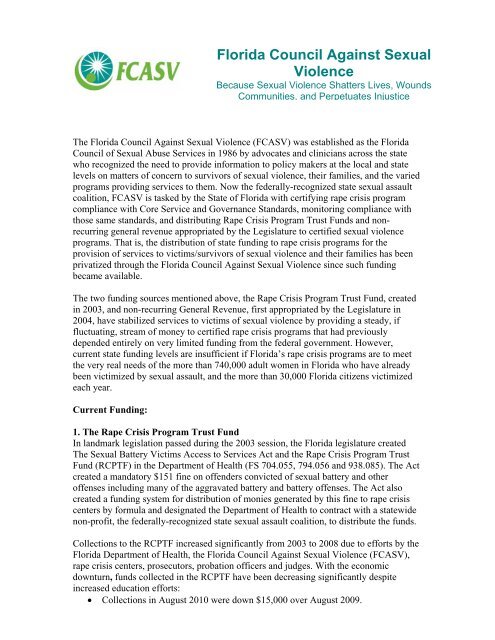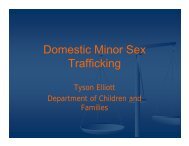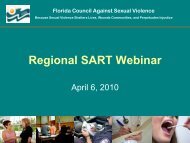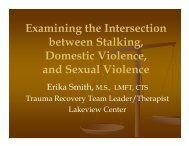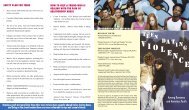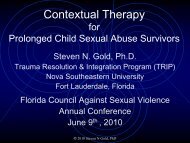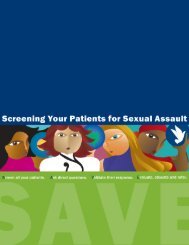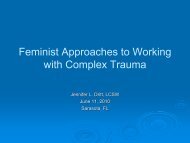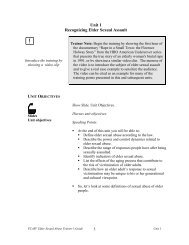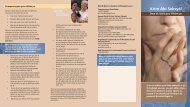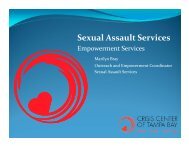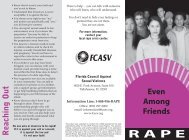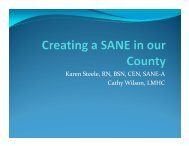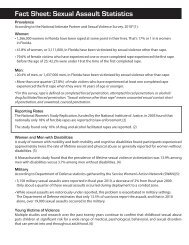funding briefing - Florida Council Against Sexual Violence
funding briefing - Florida Council Against Sexual Violence
funding briefing - Florida Council Against Sexual Violence
Create successful ePaper yourself
Turn your PDF publications into a flip-book with our unique Google optimized e-Paper software.
<strong>Florida</strong> <strong>Council</strong> <strong>Against</strong> <strong>Sexual</strong><br />
<strong>Violence</strong><br />
Because <strong>Sexual</strong> <strong>Violence</strong> Shatters Lives, Wounds<br />
Communities, and Perpetuates Injustice<br />
The <strong>Florida</strong> <strong>Council</strong> <strong>Against</strong> <strong>Sexual</strong> <strong>Violence</strong> (FCASV) was established as the <strong>Florida</strong><br />
<strong>Council</strong> of <strong>Sexual</strong> Abuse Services in 1986 by advocates and clinicians across the state<br />
who recognized the need to provide information to policy makers at the local and state<br />
levels on matters of concern to survivors of sexual violence, their families, and the varied<br />
programs providing services to them. Now the federally-recognized state sexual assault<br />
coalition, FCASV is tasked by the State of <strong>Florida</strong> with certifying rape crisis program<br />
compliance with Core Service and Governance Standards, monitoring compliance with<br />
those same standards, and distributing Rape Crisis Program Trust Funds and nonrecurring<br />
general revenue appropriated by the Legislature to certified sexual violence<br />
programs. That is, the distribution of state <strong>funding</strong> to rape crisis programs for the<br />
provision of services to victims/survivors of sexual violence and their families has been<br />
privatized through the <strong>Florida</strong> <strong>Council</strong> <strong>Against</strong> <strong>Sexual</strong> <strong>Violence</strong> since such <strong>funding</strong><br />
became available.<br />
The two <strong>funding</strong> sources mentioned above, the Rape Crisis Program Trust Fund, created<br />
in 2003, and non-recurring General Revenue, first appropriated by the Legislature in<br />
2004, have stabilized services to victims of sexual violence by providing a steady, if<br />
fluctuating, stream of money to certified rape crisis programs that had previously<br />
depended entirely on very limited <strong>funding</strong> from the federal government. However,<br />
current state <strong>funding</strong> levels are insufficient if <strong>Florida</strong>’s rape crisis programs are to meet<br />
the very real needs of the more than 740,000 adult women in <strong>Florida</strong> who have already<br />
been victimized by sexual assault, and the more than 30,000 <strong>Florida</strong> citizens victimized<br />
each year.<br />
Current Funding:<br />
1. The Rape Crisis Program Trust Fund<br />
In landmark legislation passed during the 2003 session, the <strong>Florida</strong> legislature created<br />
The <strong>Sexual</strong> Battery Victims Access to Services Act and the Rape Crisis Program Trust<br />
Fund (RCPTF) in the Department of Health (FS 704.055, 794.056 and 938.085). The Act<br />
created a mandatory $151 fine on offenders convicted of sexual battery and other<br />
offenses including many of the aggravated battery and battery offenses. The Act also<br />
created a <strong>funding</strong> system for distribution of monies generated by this fine to rape crisis<br />
centers by formula and designated the Department of Health to contract with a statewide<br />
non-profit, the federally-recognized state sexual assault coalition, to distribute the funds.<br />
Collections to the RCPTF increased significantly from 2003 to 2008 due to efforts by the<br />
<strong>Florida</strong> Department of Health, the <strong>Florida</strong> <strong>Council</strong> <strong>Against</strong> <strong>Sexual</strong> <strong>Violence</strong> (FCASV),<br />
rape crisis centers, prosecutors, probation officers and judges. With the economic<br />
downturn, funds collected in the RCPTF have been decreasing significantly despite<br />
increased education efforts:<br />
Collections in August 2010 were down $15,000 over August 2009.
During SFY 08/09, FCASV distributed $1,586,339 from the RCPTF by formula<br />
to 30 certified rape crisis centers in <strong>Florida</strong>. That figure dropped to $1,568,957 for<br />
SFY 09/10.<br />
FCASV put forward a legislative proposal during the 2010 session to enhance the Rape<br />
Crisis Program Trust Fund (RCPTF) by adding several additional crimes related to sexual<br />
violence to the mandatory fine. While the Senate bill passed, the House companion<br />
failed. FCASV plans to prioritize this legislation again during the 2011 session.<br />
2. Non-Recurring General Revenue for Rape Crisis Centers<br />
Rape crisis programs received $250,000 in the Legal Affairs budget in 2009 and 2010,<br />
$400,000 in victim compensation trust fund dollars in 2008, and $400,000 in nonrecurring<br />
general revenue in 2007—a $700,000 cut from 2006.<br />
Rape Crisis Center Response to <strong>Sexual</strong> Assault:<br />
In 30 certified rape crisis centers, staff and volunteers provide <strong>Florida</strong>’s frontline<br />
response to the crimes of sexual assault and sexual abuse serving 8,201 new (not<br />
previously served) victims of sexual violence during SFY 2009/2010 and continuing<br />
to provide services to victims first seen in previous years. Core services include:<br />
Operating 24-hour hotlines (response to 10,333 calls in SFY 09/10);<br />
Providing advocacy and accompaniment through medical and legal processes<br />
(31,433 units provided in SFY 09/10);<br />
Providing medical/forensic examinations (2,500 provided in SFY09/10);<br />
Following-up with ongoing care through individual and group counseling (21,168<br />
crisis intervention sessions; 1,812 support groups; and 10,671 therapy sessions<br />
provided in SFY 09/10).<br />
Coordinating response efforts; and<br />
Educating their communities on sexual assault and sexual abuse.<br />
Unmet Need:<br />
Rape Crisis Programs are experiencing waiting lists, severe staffing shortages and<br />
layoffs, and cannot meet the state’s need with current resources.<br />
Approximately 100 rape crisis advocates in the state of <strong>Florida</strong> provide services<br />
24 hours a day, 7 days a week. In order to serve every victim of rape in <strong>Florida</strong>,<br />
each advocate would need to reach 7,130 female survivors to provide hotline<br />
services, crisis intervention, advocacy, medical intervention and therapy.<br />
Fewer than 10% of sexual violence programs are able with current resources to<br />
provide the standard services identified as those most needed by rape victims. As<br />
a result, many programs have waiting lists.<br />
Many programs cannot afford to have a licensed therapist on staff and lack staff to<br />
run support groups, especially groups for survivors of childhood sexual abuse and<br />
male survivors. Research indicates that trauma-related intervention services<br />
(trauma-focused counseling and therapy) are the services survivors want<br />
more of from rape crisis/sexual assault treatment programs. Rape Crisis<br />
Programs have the necessary expertise, but not the necessary <strong>funding</strong>, to<br />
provide what survivors consistently need and ask for.
Several would like to hire a volunteer coordinator to increase service provision<br />
but lack available funds. After-hours advocacy and accompaniment can be<br />
competently provided by well-trained, well-supervised volunteers. Volunteers<br />
who are able to provide direct services value that experience and, consequently,<br />
further engage the community in supporting the rape crisis program. A wellfunctioning,<br />
self-seeding volunteer program substantially reduces staff<br />
burnout and frees up staff members to provide more in-depth support and<br />
on-going advocacy for survivors. Without <strong>funding</strong> to hire a volunteer<br />
coordinator, all after-hours advocacy and accompaniment is provided by<br />
already overtaxed and underpaid staff members.<br />
Rural counties and outlying areas have very few, if any, services available. In<br />
rural areas, many victims have to drive 2 hours to see a rape crisis<br />
advocate/counselor or wait 2 weeks until a rape crisis counselor is available to<br />
visit their county.<br />
Follow-up medical care, including HIV prevention medication is not generally<br />
available.<br />
$2.5 million in recurring general revenue is needed to ensure that sexual assault<br />
victims who seek services in <strong>Florida</strong> receive crisis intervention, advocacy and<br />
response to 24 hour hotlines. Additional <strong>funding</strong> would be needed to ensure<br />
survivors have access to therapy to resolve trauma and to reach out to underserved<br />
populations.<br />
The Scope of the Problem:<br />
While 10,227 forcible sex offenses were reported in <strong>Florida</strong> in 2009, only 2,877 arrests<br />
were made and many more sex offenses went unreported. (The FBI and the Bureau of<br />
Justice estimate that only 38% of sexual assault are reported to law enforcement, which<br />
would mean that there were approximately 26,773 forcible sex offenses actually<br />
committed in <strong>Florida</strong> in 2009. According to national researchers, approximately one out<br />
of every nine adult women in <strong>Florida</strong> has been the victim of forcible rape. In other words,<br />
over 740,000 women in <strong>Florida</strong> have been the victims of forcible rape (Ruggiero and<br />
Kilpatrick, 2003). Yet, at current <strong>funding</strong> levels, <strong>Florida</strong> ranks 47th in the nation in the<br />
number of rape crisis programs per capita. One program exists for every 18,000 adult,<br />
female survivors.<br />
Victims of sexual assault who do not receive recovery services face serious risks to<br />
their health and well-being:<br />
<br />
<br />
<br />
Most sexual assault survivors will experience some array of physical and<br />
psychological symptoms over time including chronic pain, gastrointestinal<br />
disorders, pelvic pain and headaches (Screening Your Patients for <strong>Sexual</strong> Assault:<br />
A Guide for Health Care Professionals, FCASV, 2009).<br />
Victims of sexual assault who do not receive services are in danger of increased<br />
substance abuse, mental health problems including major depression, suicide, and<br />
post-traumatic stress disorder (National Center for Victims of Crime, 1999).<br />
Sixty-one percent of homeless girls and 16% of homeless boys report sexual<br />
abuse as the reason for leaving home (Estes & Weiner, 2001).
<strong>Sexual</strong> <strong>Violence</strong> is costly to community well-being:<br />
Rape is responsible for 11-20% of teenage pregnancies (Boyer and Fine, 1993).<br />
Rape victims’ visits to medical providers increase almost 60% a year after the<br />
assault and over 30% in the second year after the assault (Koss, 1993).<br />
<strong>Sexual</strong> assault hurts our state’s economy, and the economic impact worsens if<br />
victims do not receive the services they need to re-gain their stability:<br />
<br />
<br />
<br />
<br />
<br />
<br />
<br />
Medical expenses, lost productivity, treatment of psychological trauma, pain and<br />
suffering are estimated to cost each victim $110,000 (United States Department of<br />
Justice).<br />
21% of victims miss eleven or more days from work as a result of the crime.<br />
(Bureau of Justice Statistics).<br />
Fifty percent of rape victims lost or were forced to quit their jobs in the year<br />
following their rapes due to the severity of their reactions (Ellis, Atkeson &<br />
Calhoun, 1981).<br />
Adverse childhood experiences (ACEs), including child sexual abuse, can lead to<br />
poor job performance and work absenteeism in adulthood (Anda et al., 2004).<br />
<strong>Sexual</strong> assault victims lose approximately $2,200 due to decreased productivity<br />
and lost wages in the aftermath of sexual violence (MacMillan, 2001).<br />
<strong>Sexual</strong> assault victims earn $6,000 less in annual income than non-victims<br />
(MacMillan, 2001).<br />
Lifetime income loss, due to sexual violence in adolescence, is estimated at<br />
$241,600 (MacMillan, 2001).<br />
Jennifer Dritt, Executive Director Terri Poore, Public Affairs Director<br />
jdritt@fcasv.org<br />
(850) 297-2000 (office)<br />
tpoore@fcasv.org<br />
(850) 297-2000 (office)<br />
(850) 321-0781 (mobile) (850) 228-3428 (mobile)


